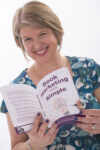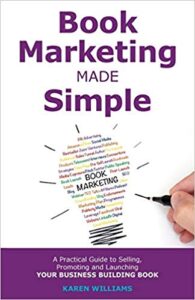Years of experience make an industry expert. But it's often when you publish a nonfiction book in your expertise area that you propel your business into the limelight. But should all businesses have nonfiction books? Partner member Karen Williams, from The Book Mentor, thinks that if you do write a book in your expertise area, there are ten nonfiction elements that boost your business which should be included.
When it seems that everyone around you is writing a book, how do you ensure that yours is the one that stands out and makes an impact? Although it’s the in-thing to do, it’s not working for everyone. There are 10 principles that I believe you need to follow to get to that end goal of writing a book that helps you to boost your business, which I’m sharing in this blog, and will be going into in more detail in my next book, which you can get priority notifications on here.
There’s been a flurry of thought leadership over the last few years. More and more business owners are striving to get noticed and writing a book has become the tool of choice. It’s become the in-thing to do to increase visibility, credibility and expert status.
-
Start With the End in Mind
 In a recent Librotas survey, I asked the respondents “What is the vision for your book?” The responses lay in two distinct camps, although there was overlap. Some have a clear business intent, such as using their book as a credibility builder, a platform for opportunities and attracting more clients. For others, there was a more altruistic focus with personal reasons for writing the book, such as supporting and inspiring others, giving hope in the face of adversity, and leaving a legacy.
In a recent Librotas survey, I asked the respondents “What is the vision for your book?” The responses lay in two distinct camps, although there was overlap. Some have a clear business intent, such as using their book as a credibility builder, a platform for opportunities and attracting more clients. For others, there was a more altruistic focus with personal reasons for writing the book, such as supporting and inspiring others, giving hope in the face of adversity, and leaving a legacy.
When you start with the end in mind, you get clear on what people want to hear from you. Then you can hone your topic so that it’s aligned to your business and enables you to leverage your expertise. By writing a book that helps a specific reader with a specific problem, and marketing it well, you’ll be able to make a difference and build your business at the same time.
-
Choose Your Subject Wisely
If you’re writing a book to support your business, you probably have a clear idea of who your ideal reader is, but it’s one thing knowing this and it’s another thing deciding what to write. Even if you have a clear and aligned niche, you probably still have tons of information you could share.
If you want your book to be successful, I’d advise you to refine your message further before you start to write it. Find out what people want to hear from you through a survey, poll or one-to-one conversations.
At this stage, you may realise that you have more than one book to write, and that’s great. Then when you have an idea or receive a piece of information, you can decide whether it goes in your current book or one that’s later in your plan. There are 21 questions that we ask in our Get Started Workbook (downloadable at www.librotas.com) that we advise all authors to complete before they get started and they will help you too.
-
Finding Your Secret Sauce
Once you’ve decided the topic for your book, the problem you’re solving and the solution, it’s also important to find your secret sauce – the thing that makes you different – and the hook and angle that you plan to take in the book. Don’t regurgitate what others have written on the subject. If you want to be disruptive, this is your chance to do so!
A good place to start is by doing competitor research. If you’re already running a business, you probably know who else is working in a similar industry. But if you don’t then please start here! Have any of them written a book? If they have, what is the unique angle and hook that makes your book different?
-
Structure Your Book Well
There’s nothing I like better than getting out a pile of Post-it notes and sitting down with a client to map out their book. If you’re writing a ‘how to’ or ‘self-help’ book, think about the journey you already follow with clients, so you can layer the information. If your book is memoir in style, what were the key turning points and how are they relevant to your reader?
Many people try to make their book too complicated and difficult. They think they have to come up with a new concept or idea, when actually what they are doing already works. But they may need help with what to say and in what order.
Some also struggle to see the value of what’s in front of their own nose. As it’s something that comes naturally to them, they find it hard to see it from a reader’s point of view – someone who doesn’t know the subject and wants to learn from them.
-
Schedule Time to Write
I come across many people who start with writing and don’t follow principles 1–4. Then they waste huge amounts of time and write many thousands of words before they get focused. And it will be more painful later when they’re trying to work out where everything fits!
I’m often asked whether there’s a secret to getting the writing done. I do believe that preparation is key, but to actually sit down to write it, I’d suggest you start by working out when and how you write at your best, and then you have to prioritise time to write it.
If you write well for half a day a week, it should take you around six months to get to a reasonable first draft of around 40–50,000 words. If you have more time, or can go away on a writing retreat, it will be quicker. But don’t underestimate the editing time.
If you want an easy way to write your book, just make sure everything is aligned as I mentioned earlier. Gather your material together, turn your book into blogs or vice versa, run webinars, give talks and take any opportunity to test your material.
-
Sharing Your Story and Seeding Examples
I work with very few authors who don’t have a story behind their book. Some have been through devastating experiences and others want to share the knowledge and the lessons they’ve learnt. When you share your story, your reader will get to know you as a person, and as you probably know, ‘people buy people’!
But it can be an incredibly vulnerable thing to share things that are personal. However I would advise you to leave your ego at the door! You may also wish to seed other people’s stories, expert tips and advice (with permission). This gives you the perfect opportunity to showcase how you work with clients, which may influence a reader’s decision to work with you after reading your book.
-
Coping With Sensitivity and Overwhelm
When you write a blog or post on social media, it can be deleted. But the same can’t be said about a book. Once it’s in the public domain, there’s no easy way of recalling the information.
You may be putting your head above the parapet for the first time. Although this is a good thing business-wise, it can be daunting. When you put anything ‘out there’ for feedback, even at the research and writing stage, people will tell you what they think, and it’s amazing what resistance we can come up against if we don’t deal with it. Staying stuck won’t help you to get your book finished.
When I wrote my first book in 2009, I went through months of asking myself whether I was good enough and whether I had something important to say, which is common among authors. I had to quickly change the way I thought, otherwise I’d have never published it.
It’s safe to say that we all have a critic and will face overwhelm at some stage. When you have the resources or support to manage it, whether this is a mentor or cheerleaders to help you, then you’re more likely to start, finish and publish your book.
-
Getting Support
When you want to ensure that your book sells you and your business, don’t do it alone. There are various people who would add value by being on your team. You may engage a book mentor like me to help you with the strategy and marketing, developing the content and helping to ensure it happens in a timely manner.
If you’re publishing your book yourself, you need a great team to help with the editing, proofreading, design and publishing. If you’re writing a book to build your brand, it does need to be a brilliant book, both in terms of content and quality of the book itself and, with this in mind, you need to invest money in it.
-
Being Savvy About Sales
You won't be successful if you write and publish your book, then sit back and hope someone is going to buy it. To achieve the results you desire, you need a great plan. Even if you get a publishing deal, most of the marketing will be down to you. No one will be as committed to your book as you are!
 Being savvy about sales means promoting your book as you write it, when you launch it, then keeping the momentum going after you’ve published it. For most entrepreneurial authors, success isn’t just about book sales. When you’ve written your book well and become clearer about your message through the process, it will reap its rewards in other ways, such as new business and new opportunities, product sales, attracting clients, securing speaking opportunities, winning awards, radio and TV exposure, and becoming known as the go-to person in your industry. I’ll be sharing more real-life examples like this in my new book.
Being savvy about sales means promoting your book as you write it, when you launch it, then keeping the momentum going after you’ve published it. For most entrepreneurial authors, success isn’t just about book sales. When you’ve written your book well and become clearer about your message through the process, it will reap its rewards in other ways, such as new business and new opportunities, product sales, attracting clients, securing speaking opportunities, winning awards, radio and TV exposure, and becoming known as the go-to person in your industry. I’ll be sharing more real-life examples like this in my new book.
-
Showing up in a Bigger Way
You can show up in a bigger way at any time during your business or book writing journey. If you want to reach more people with your book, one area to consider is how you can build your platform. Who do you know who can help promote your book and who do you want to get your book in front of?
When I launched Book Marketing Made Simple, I followed the advice in the book! This led to podcasts, interviews, guest blog posts, and more, which helped to make the book successful and reach the Amazon bestseller spot.
But success for business authors is more than these small quick wins; what’s important is how you can step into your thought leadership. When your business is aligned to your passions and your purpose, then it’s easier to use the momentum in your book to follow that passion, be disruptive, shake things up or be a force for good.
There are ten nonfiction elements that boost your business @librotas #selfpublishing #IARTG #ASMRG #amwriting #writingcommunity #writetip Share on X
OVER TO YOU
What factors that boost your business do you employ? Have you got an expertise are you've always wanted to turn into a nonfiction book?
If you enjoyed this post, you might like these from the ALLi archive:





Hi Wally, thanks for your comments. Amazon doesn’t actually display bestseller status after the event I’m afraid and this was back in 2014. The reason for the number of reviews is that the book was reissued as a second edition in 2017 and I’ve focused on my other books since then, hence this edition only has 4 five star reviews (the first edition has 25 five star reviews, but unfortunately Amazon cannot transfer these across when you do a new edition).
Actually, this was a good exercise for me to review the stats in my Amazon account. So here goes.
I’ve published five books of my own (with the sixth going live next week).
In total of all five books published so far (with one more going live next week), I’ve had 102 reviews on Amazon , most of these are five star reviews.
I hope this alleviate your concerns about my credibity.
The author claims that her book marketing book was an Amazon best seller. I’m looking at the Amazon page for the book. It shows 3 reviews since publication in 2017. None is from a “verified purchase.” There’s nothing on the page about the book being a best seller. Is there a reasonable explanation for this discrepancy?
Hi Wally, obtaining an Amazon Bestseller status is a reflection of sales activity in a particular point in time and particular category. Just because a person is unable to find evidence of former bestseller status is NOT evidence that it did not, at one time, exist. The badges are removed as soon as the sales numbers change, and they are always changing. Also, while there is a relationship between reviews and sales, it is not accurate to suggest that the number or quality of reviews is any indication one way or another of the previous existence or lack of an Amazon bestseller badge. Thanks for your comment.
This is also an excellent reminder for us all to remember that Amazon is not the only game in town: many of our authors can legitimately claim to be “bestselling authors” without ever attaining Amazon bestseller status and for many of our authors, Amazon does not even represent the majority of their income from book sales. Which brings up another point. It is so easy for us to judge the claims of other authors based on our own viewpoints, which may be faulty or narrower than reality. We never know all the facts, all the distributor points, or all the background. And at ALLi we like to celebrate achievements of all authors and we value and encourage the sharing of experience and wisdom, one author to the next.